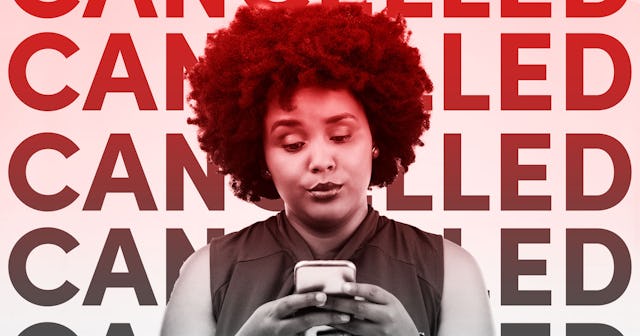My Problem With Cancel Culture — As A Black Woman

Is it just me, or have you had your fill of “cancel culture”? Of course, I am all for calling out instances of racism, sexism, transphobia, patriarchy, and all other discriminatory or harmful acts. That is what cancel culture was initially about. But lately, it seems this form of social activism has been co-opted and even turned into a game of political football. And honestly, as a Black woman, I am over it.
In case you aren’t quite sure what cancel culture is … it is a form of social ostracism carried out against an individual or institution for actions considered objectionable, harmful, or offensive. The goal is to revoke all social, political, or cultural cache by boycotting their work or product, blocking them from social media, and calling for disciplinary action either from an employer or an authoritative entity.
In most cases, this happens when a public figure, or private citizen, gets caught doing or saying something that is at the very least offensive. A public backlash fueled by social media usually ensues. And soon after that, the calls come to “cancel” the person. And in many instances, the consequences of being canceled are completely deserved.
Yes, cancel culture is subjective. Some say it’s a form of censorship, and others say it has created a platform that democratizes shaming. But I would argue that it has actually provided a more equal playing field and given marginalized populations more power as a collective voice. That means it’s not so easy to get away with racist, sexist, and bigoted behavior because the keyboard activist will be quick to “call you to the mat.” And rightfully so.
There is nothing like a good calling out on social media to hold people accountable for their actions. And it’s hard to deny that cancel culture has effectively combated offensive and harmful wrongdoing to others. And it has also helped spark important conversations like #OscarsSoWhite and brought to light charges of sexual assault, sexism, and unfair treatment of women during the #MeToo movement. And the consequences have been severe for some and not enough for others.
Hill Street Studios/Getty
After being accused of sexual assault, Kevin Spacey hasn’t done any new projects since his appearance in 2018’s “Billionaire Boys Club.” Although it took many years and many accusations, R. Kelly faces numerous sexual assault and abuse charges and has finally been removed from Spotify playlists. JK Rowling was canceled for tweeting transphobic comments and then doubling down with even more problematic comments when called out. And Amy Cooper was fired from her job, lost ownership of her dog, and had to face criminal charges after falsely accusing a Black birdwatcher of assaulting her. And more recently, Piers Morgan was canceled for continually making racist and derogatory statements regarding Meghan Markle.
On the other hand, there are many cases of cancel culture going too far. People are being canceled for things like resurfaced decade-old tweets, traveling during the pandemic, and voicing unpopular opinions. One example is the firing of Alexi McCammond, the new top editor of Teen Vogue, for resurfaced anti-Asian remarks she tweeted when still in high school. Because, of course, McCammond’s tweets are much more problematic than the way Vogue has admittedly treated Black editors, writers, photographers, designers, and other creators over the years.
People called for celebrities like the Kardashians, Sofia Richie, and Dua Lipa to be “canceled” for traveling during the pandemic. Singer Lizzo was called out for promoting a 10-day detox smoothie diet, and Charli and Dixie D’Amelio were “canceled” for acting like ungrateful brats to their private chef. And although some of these instances are problematic, there needs to be a level of leeway that allows people to make mistakes, apologize and grow.
When “clicktavists” come for any little thing that they find disagreeable with the same fervent mob mentality, it dilutes the power of cancel culture. It undermines the gravity of issues like sexism, racism, and discrimination. And frankly, I believe that’s what has happened over the past year, and I am over it. It has gotten to the point where cancel culture is inciting more anger and defensiveness than social change, insight, and conversation.
And now politicians have jumped on the bandwagon and taken advantage of the bastardization of cancel culture. They have co opted this social justice movement and turned it into another avenue for the political right and left to virtue signal and hurl insults at each other. Meanwhile, those that are regularly disenfranchised in one form or another are once again being excluded from the conversation they started.
We are losing sight of the fact that this isn’t really about Mr. Potato Head or Dr. Seuss books. This is about the people who have to fight the effects of racism, sexism, transphobia, and all forms of bigotry daily just to live their lives as who they are. And maybe, just maybe, if everyone used the same energy to work towards justice and equality in their own communities and social circles, cancel culture would not be unnecessary. But I guess it’s easier to point fingers and sling accusations than take accountability for how this country treats marginalized people.
This article was originally published on